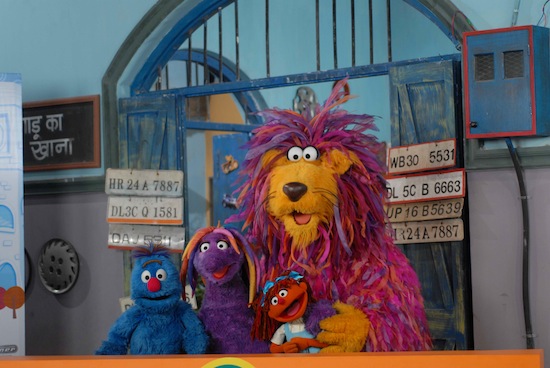UW analysis shows learning impact of ‘Sesame Street’ around the world

Local “Sesame Street” characters from India’s international co-production, “Galli Galli Sim Sim.” © 2013 Sesame Workshop. All rights reserved.
According to a soon-to-be published meta-analysis conducted by researchers at UW–Madison, watching international co-productions of “Sesame Street” has a positive effect on children’s learning and is an “enduring example of a scalable and effective early childhood educational intervention.”

Mares
Commissioned by Sesame Workshop, the nonprofit educational organization that revolutionized children’s television programming with the landmark “Sesame Street” and produces local “Sesame Street” programs seen in over 150 countries, the study was led by UW researchers Marie-Louise Mares and Zhongdang Pan, who will present their analysis at the 2013 Biennial Meeting of the Society for Research in Child Development in Seattle.
The authors analyzed the results of 24 studies, conducted with more than 10,000 children in 15 countries. Their findings indicate significant positive effects of exposure to “Sesame Street” across a number of learning outcomes: cognitive outcomes (including literacy and numeracy), learning about the world (including health and safety knowledge), and social reasoning and attitudes.
The study showed an average 11.6 percentile difference between viewers and nonviewers. This is comparable to what other researchers found in an evaluation of interventions in which children in developing countries were assigned to attend on-site preschool programs and/or caregivers were trained to provide higher quality care. Through its broadcasts and other distribution mechanisms around the world, however, “Sesame Street” reaches a vastly larger scale impacting millions of children daily.
Read a Q&A with Marie-Louise Mares about the findings.

Pan
“The significant, positive effects of cognitive, learning, and socio-emotional outcomes observed in the current meta-analysis represent real educational benefits for the millions of preschool-age children around the world who visit ‘Sesame Street’ via their televisions,” says Mares.
Starting with the earliest studies conducted by the Educational Testing Service in the 1970s, “Sesame Street” has become the most researched television show in history. A significant body of evidence of the program’s educational value in the United States has emerged. The meta-analysis offers insights into the strengths of the application of Sesame Workshop’s localized approach to developing high quality educational media for young audiences across the globe.
“With programs designed by producers and educational specialists in the countries where we work, our international projects seek to meet the most critical educational needs of children in a given locale,” says Charlotte F. Cole, senior vice president of global education at Sesame Workshop. “Research helps us understand children’s changing needs, how media can best address those needs, and most importantly, if the programs are having an effect. We are thrilled to have additional solid evidence that our approach is contributing to early childhood education efforts and supporting early learning around the world.”
“Sesame Street” has a global reach of at least 156 million children in the 0-7 age range. Beyond television, Sesame Workshop produces content for multiple media platforms on a wide range of issues including literacy, health and resilience. Initiatives meet specific needs to help young children and families develop critical skills, acquire healthy habits and build emotional strength to prepare them for lifelong learning.
“Effects of Sesame Street: A meta-analysis of children’s learning in 15 countries” will be published in the Journal of Applied Developmental Psychology (Elsevier) in its May/June issue, Volume 34, Issue 3.




